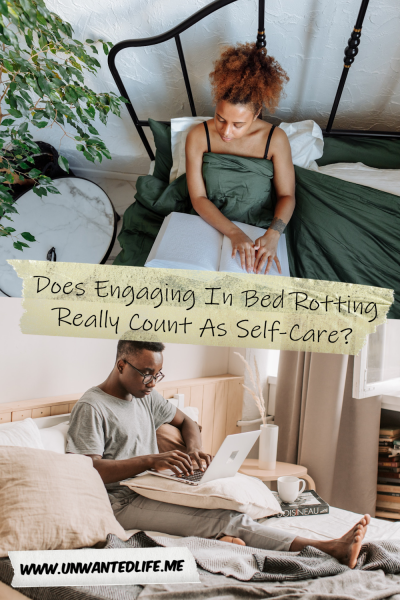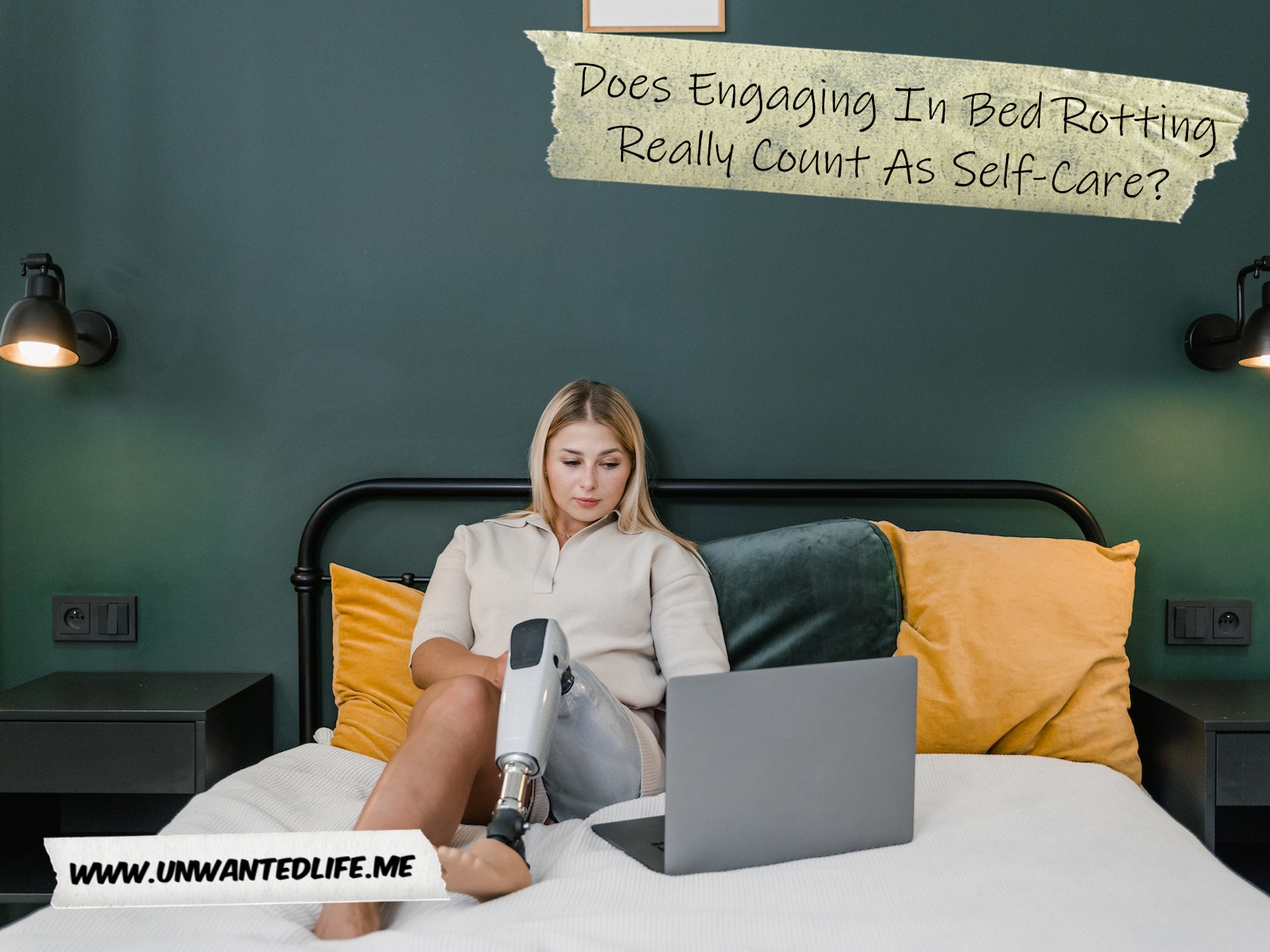There’s a trend going around called ‘bed rotting’, which claims to be an act of self-care. Because the term is new to me, I thought I’d look into it to see if it had any merits or not. Thus, this article reflects what I found out. I hope you find it interesting.
What Is Bed Rotting?
The idea behind bed rotting appears to come from people wanting a slow pace of life, with this slower pace of life and new self-care trend happening in the bedroom, specifically, the bed (Nottingham Post). Simply put, bed rotting is the act of staying in bed for extended periods of time to watch TV, eat, read, and basically chill out, rather than to sleep (Tom’s Guide).
According to psychologist Robert Common, bed rotting is different from bed rest, such as what you might do to overcome an injury or an illness. Instead, this is an act of shunning hustle culture and constant productivity in exchange for self-care.
You might be familiar with bed rotting by its previous names from my ageing generation, vegging, and apparently, horizontal time (Fortune Well). It’s not really a new concept, it just has a facelift, so it appears new to the new generation of veggers.
The Benefits Of Bed Rotting
Courtney DeAngelis, speaking to Health, states that if bed rotting is done in small doses, then it can calm the body, helping reduce stress and exhaustion, especially for people in mentally and physically demanding jobs. This is because the act of bed rotting is a simple act of self-care in a world of elaborate morning routines and self-care ritually (Fortune Well). Such complicated acts of self-care can be off-putting and motivation can quickly disappear for the amount of effort it takes to engage in them. Simple is better, unless it’s a hobby or an interest you have.
This is supported by Nicole Hollingshead who spoke to Health. They said that now lounging has been accepted and recognised as a way to relax, it means it’ll also allow other people to do the same. Thus, people can now embrace lounging rather than actively having to do something as their only form of self-care.
There is nothing wrong with listening to your body, taking stock, and having a break when you need it so you can recoup your energy (Fortune Well). This is especially true for those of us with health issues and is something you’ll hear spoonies talking about.
Although some people try to glorify being busy and productive for every waking second of their lives (Nicole Hollingshead speaking to Health), that doesn’t mean it’s a good thing. The way society is structured is that it’ll have you working yourself into an early grave, and for what? You can’t take it with you. Therefore, I highly recommend engaging in low-energy self-care from time to time.
Potential Downsides Of Bed Rotting
Rest certainly shouldn’t be seen as a reward, because the reality is, it’s a requirement. Thus, you shouldn’t feel guilty for taking time to rest. However, you’ve also got to be careful to not go too far the other way, as that can become harmful (Fortune Well). Everything in life should be done in moderation, even moderation.
For example, if bed rotting becomes a routine behaviour, one that dominates your life and how you spend your free time, then that could be an indication of burnout or depression (Nottingham Post). In such situations, seeking support would be advisable.
One thing recommended in therapy when people are feeling low is to push yourself to do things. This is because it can help kick-start your sense of enjoyment again. Although, it doesn’t always happen overnight. Thus, the practice of bed rotting might want to be used sparingly, because you could create a new behaviour that has long-lasting effects on your mental health that might take a long time to overcome in the future.
I mistakenly created a behaviour like this while trying to overcome my reliance on friends to go out at the weekend, because when they let me down, I’d become cripplingly suicidally depressed. The steps I used to overcome this created a binge eating disorder, which I had treatment for this year. Yet, hasn’t gone away. I still have a very messed up relationship with food.

Therefore, if you’re going to engage in bed rotting, it can be useful to do so with a plan in mind that factors in things like, what am I doing this for and how long am I going to engage in this (Fortune Well). It’s always good to have healthy boundaries, even one regarding your acts of self-care.
One of the big problems with bed rotting is how it can create and promote the wrong associations (Tom’s Guide). In order to have the best chances of maintaining a good sleep cycle, keeping our beds associated with sleep is great sleep hygiene (Nottingham Post). It’s important, when possible, to keep your bed and bedroom associated with sleeping, so it’s easier for your body to know when to prepare itself for sleep, starting the internal process.
If your bed rotting is starting to have negative effects, then you can re-energise by journaling (Men’s Health) or engaging in more active rest, such as getting outside, socialising, and going for a walk (Fortune Well and Men’s Health). Nature and green spaces are especially helpful with this.
It should also be noted that bed rotting can put people at greater risk if they’re already experiencing depression, as it can worsen symptoms and perpetuate the cycle of negative behaviours and feelings (Buzzfeed). Instead, a more active form of relaxation would be more beneficial to help someone escape that depression cycle.
Carcass Time
We’ve talked a lot about bed rotting, which makes sense because that’s the topic of the article, but there is also something else I’d like to throw into the mix, and that’s carcass time. According to Men’s Health, carcass time is a watered-down version of bed rotting. Instead of spending all day or several days lounging around in bed, rotting, you just do it for an hour here and there. Think breakfast in bed at the weekend kind of thing.
I never thought I’d say these words, but carcass time would be the far more healthy version of lounging in bed as a form of self-care. It’s also the version I’d suggest people engage in.
Summary
Bed rotting is just living in shared accommodation throughout my adult life. Unless you could afford a big enough room for additional seating, you had little choice but to do everything from your bed. I’m currently in that situation now. When I’m not working at my desk, I’m on my bed eating and watching TV because I have little space at the moment. And I don’t like it.
I need that separation between my sleeping environment and doing everything else, even if it’s a sofa in the bedroom. Otherwise, it negatively affects my depression quite a lot, especially because of my age. This certainly won’t be a trend I’d try willingly, except maybe for the odd day here and there after a long night out.
Bed rotting can be a positive act of self-care, but like anything in life, it’s about finding the right balance (Tom’s Guide). How we go about it is just as important as the message to prioritise low-effort self-care and rest time. You can binge-watch TV from a sofa, rather than your bed, so your bed remains associated with sleep, for example.
Maybe the best way to find a balance with the self-care activity of bed rotting is to adopt the carcass time alternative.
As always, leave your feedback in the comments section below. Also, please share your experiences with bed rotting, carcass time, and vegging in the comments section below as well. Don’t forget, if you want to stay up-to-date with my blog, then sign up for my newsletter below. Alternatively, get push notifications for new articles by clicking the red bell icon in the bottom right corner.
Lastly, if you’d like to support my blog, you can make a donation of any size below. Until next time, Unwanted Life readers.


I love staying in bed reading, watching Netflix, and even playing with my phone. But I don”t know that this is called bed rotting. So now I can use this term to describe some of the things I’m doing for self-care. Thank you for sharing.
Thanks for commenting
I don’t stay in bed anymore but as a teenager I spent a lot of time “bed rotting.” I associate the bed with sleep and the horizontal tango if you know what I mean. The bed is not where laptops or phones belong, although I don’t really see a book being a problem – books make me sleepy whereas phones keep me wide awake, regardless of whether I’m in bed or on the couch.
Books and bedtime go together like a hand in a glove. Thanks for commenting
Honesty, I do stay in bed for a long time but only when not feeling good as depressed, or anxiety attacks. Because I reach to a point where can’t do anything but to do that. For me, I don’t see it is a self care unless it’s recovery.
Thanks for commenting
Great post! I didn’t know either one of these terms since I guess I’m not on Tiktok or cool with Gen Z lingo but I loved this article. I think bed rotting sounds like it coudl too easily turn into doom scrolling, series binging and junk food binging if there are no boundaries. I like the idea carcass time I love grabbing a coffee and reading in bed a bit longer on Sundays. Thanks for posting this!
I don’t use TikTok or know much about the new generation’s slang either, but this one just randomly appeared before me so I wrote about it ha ha ha. Thanks for commenting
Very well written
Thanks
I do love naps & chilling in bed, but can’t stay there too long! I also don’t really like this term for it. Never heard of it before.
A nap can sure be beneficial sometimes. Thanks for commenting
I really enjoyed this article, and I agree that there does need to be a median. Also, for one to consider the psychological aspects of why they are staying in the bed all day. I definitely feel this is me on Sundays if I can help it! Lol
Thanks for commenting